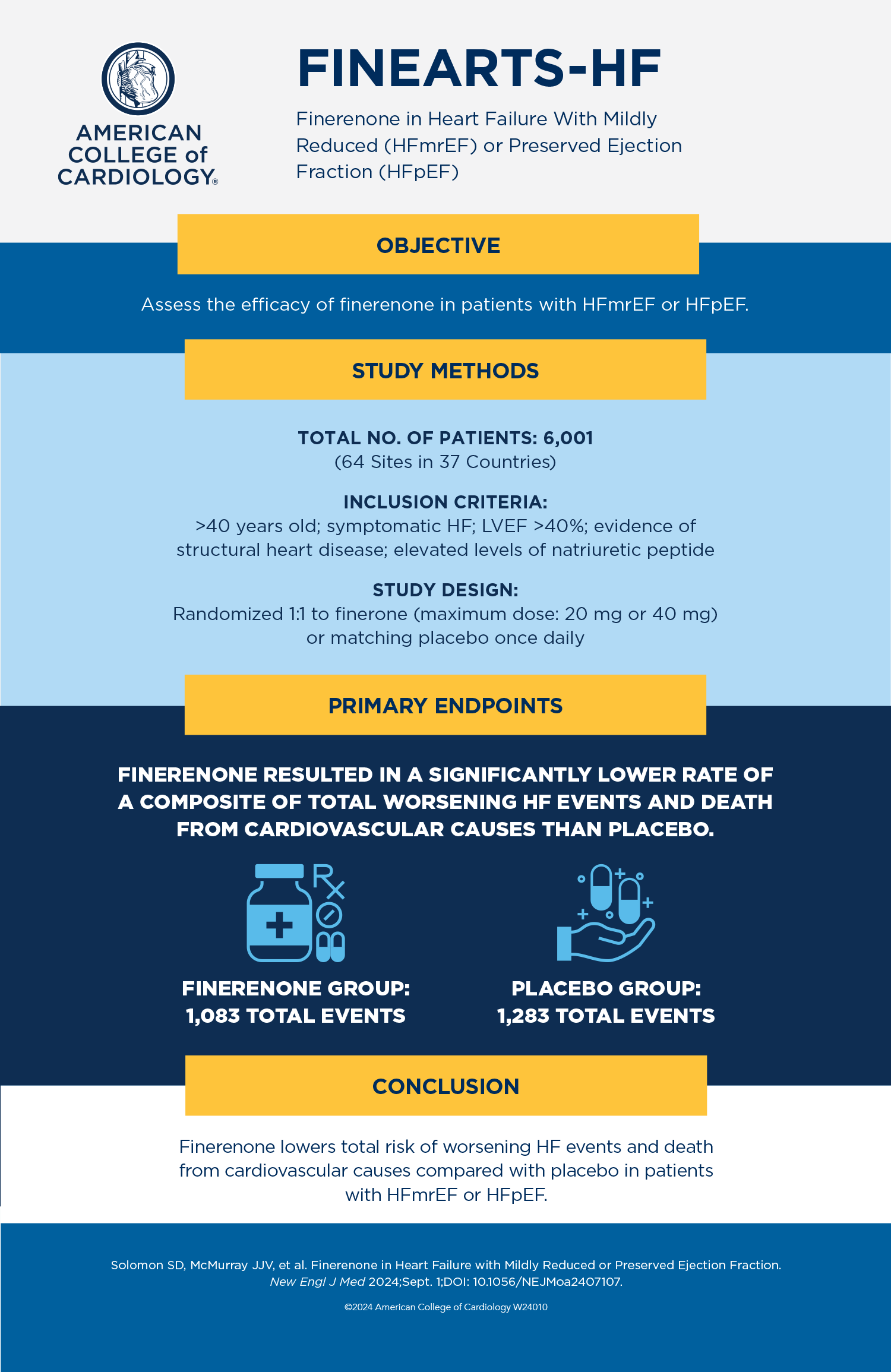New Research Explores Benefits of Finerenone in Patients With HFmrEF or HFpEF; More
In patients with heart failure (HF) and mildly reduced or preserved ejection fraction (HFmrEF/HFpEF), finerenone had a significantly lower rate of worsening HF events and cardiovascular-related death than placebo, based on findings from the FINEARTS-HF trial presented at ESC Congress 2024 in London and simultaneously published in The New England Journal of Medicine.
Researchers randomized patients with HF and a left ventricular ejection fraction of 40% or greater to received finerone at a maximum dose of 20 mg or 40 mg once daily (n=3,003) or matching placebo (n=2,998), in addition to usual therapy. The primary outcome was a composite of total worsening HF events or death from cardiovascular causes over a medium of follow-up of 32 months.
Overall results showed primary outcome events occurred in 624 patients in the finerone group compared with 719 patients in the placebo group. Broken down by events, the total number of worsening HF events was 842 in the finerenone group and 1,024 in the placebo group, while the percentage of patients who died from cardiovascular causes was 8.1% and 8.7%, respectively. Researchers noted that finerenone was associated with an increased risk of hyperkalemia and a reduced risk of hypokalemia.
"The FINEARTS-HF trial provides the first definite evidence that an MRA is beneficial in HFmrEF/HFpEF. We have four pillars of guideline-directed medical therapy in HFrEF, but only SGLT2 inhibitors as a treatment option for HFmrEF/HFpEF, said Scott Solomon, MD, FACC, the principal investigator. "Given that finerenone was beneficial in patients already receiving an SGLT2 inhibitor, our findings point to finerenone as a new second pillar in HFmrEF/HFpEF."
Two separate editorial comments published in JACC, address the FINEARTS-HF findings. "Why have we not been able to demonstrate reduced mortality in patients with HFmrEF/HFpEF," ask Toru Kondo, MD, PhD, and Alasdair D. Henderson, PhD, et al., in one comment. "No randomized controlled trial has yet demonstrated a statistically significant reduction in mortality in [these] patients, in contrast to the benefits observed in [HF] with reduced ejection fraction (HFrEF)," they write.
In the second comment, Muthiah Vaduganathan, MD, MPH, and Brendon L. Neuen, MBBS, PhD, et al., tackle the challenge of modifying kidney disease progression in patients with HF. "Although [chronic kidney disease (CKD)] and HF highly overlap at the population level, therapies known to be kidney protective in CKD do not appear to have the same effects on classical kidney outcomes when evaluated in HF trials," they write. With traditional HF clinical trial designs conducted over typical durations of follow-up, we should not expect that therapies will be able to meaningfully and consistently modify conventional clinical kidney endpoints."
In a large pooled analysis of data from FIDELIO-DKD, FIGARO-DKD and FINEARTS-HF called FINE-HEART, which was also presented at ESC Congress 2024, investigators said their findings "failed to demonstrate a significant reduction in cardiovascular death." However, they noted that this may be due to the definition of cardiovascular death used and the classification of deaths of undetermined causes. That being said, reductions in all-cause death and a broad range of other cardio-kidney outcomes including kidney disease progression and HF hospitalizations were observed.
"Pooling these data summarizes complementary lines of evidence which support a disease-modifying potential role of finerenone across the cardio-kidney-metabolic spectrum," said Muthiah Vaduganatha, MD.
In a second analysis from ESC Congress 2024 looking more broadly at mineralocorticoid receptor antagonists (MRAs), including finerone, researchers found a reduced risk of cardiovascular death or HF hospitalizations in patients with HFmrEF, HFpEF, or HFrEF. In looking at data from RALES (spironolactone), EMPHASIS-HF (eplerenone), TOPCAT (spironolactone) and FINEARTS-HF, they noted the findings "confirm the benefits of MRAs in patients with HF, across the spectrum of ejection fractions."
Clinical Topics: Heart Failure and Cardiomyopathies, Acute Heart Failure
Keywords: ESC Congress, ESC24, Heart Failure, Diuretics, Mineralocorticoid Receptor Antagonists, Diabetes Mellitus, Type 2, Kidney Diseases
